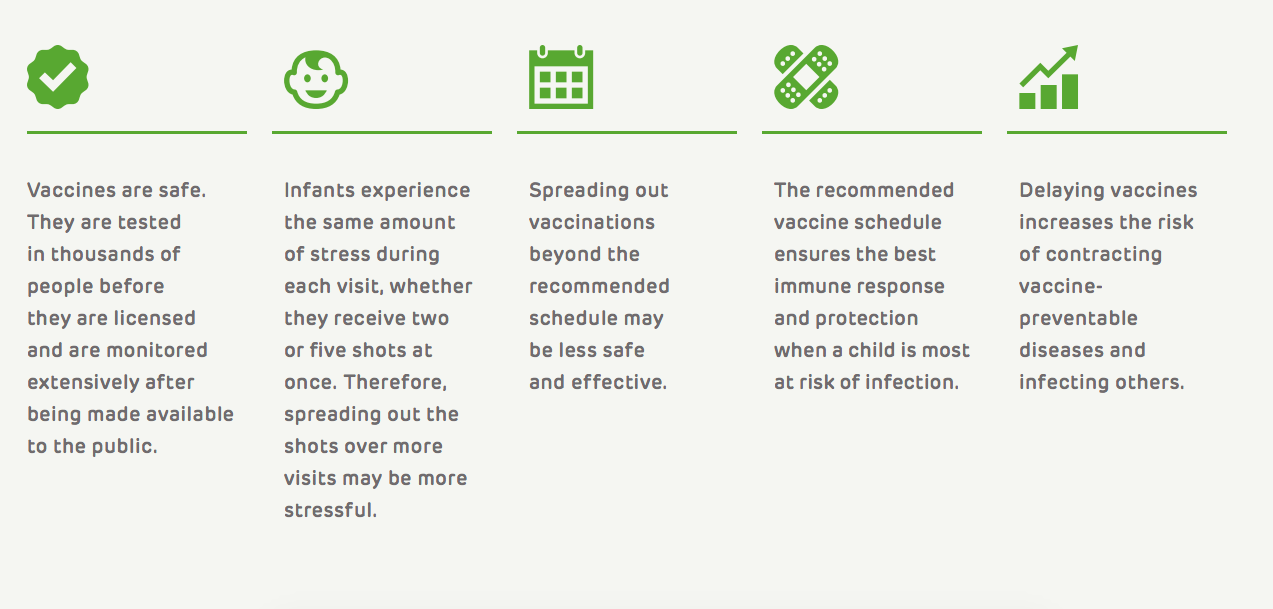Supporting Effective Immunization Policy: Identifying and Addressing Barriers to Timely Immunization
Statement of Problem
Despite availability and routine recommendation of these vaccines, approximately 42,000 adults and 300 children in the United States still die each year from vaccine-preventable diseases. While ongoing vaccination programs help to keep these diseases at bay, some vaccine-preventable diseases have been re-emerging. The shift toward intentional vaccine delay and refusal is directly associated with increased occurrence of preventable diseases for individuals and entire communities. Furthermore, infants and young children with delayed vaccinations are more likely to be under-immunized as they get older.
A rise in vaccine hesitancy—a behavior influenced by lack of trust in the medical community, concerns about vaccine safety, efficacy, necessity or convenience and other issues related to vaccination—has contributed to undervaccination through parental decisions to delay or refuse vaccines for their children. The goal of this research portfolio is to provide a conceptual framework for understanding the multiple factors that impact vaccine acceptance, explore strategies for effective vaccine communication, particularly in an era of increasing access to information and consider the implications of advocacy and policy approaches to address vaccine hesitancy.
Description
Talking Points to Address Vaccine Hesitant Parents
Talking Points to Address Vaccine Hesitant Parents


Health care providers can reduce or eliminate the number of patients on alternate vaccination schedules by addressing some of the most common concerns about vaccine safety and efficacy.
Dr. Feemster and her team have conducted several studies to better understand vaccine initiation barriers related to vaccine hesitancy and how to overcome them:
- A 2009 study of newborns from a large urban setting found that children most at risk of late vaccine initiation are those whose mothers attend fewer prenatal care visits and who are younger, less educated and already have at least one other child. These delays may not be driven by negative attitudes toward vaccines, but demonstrate that barriers to accessing vaccines combined with an underappreciation of the severity and prevalence of preventable diseases can keep children from being fully vaccinated on time. Dr. Feemster’s findings suggest that it is critical to target at-risk mothers early, even prenatally through vaccine education and to encourage prenatal pediatric visits. These data also highlight the potential for immunization registry data to identify infants for targeted outreach.
- PolicyLab researchers Dr. Alex Fiks and Dr. Feemster evaluated the feasibility and impact of interventions informed by behavioral economics (retail pharmacy vouchers for Tdap vaccines and a celebrity public service announcement) to increase Tdap vaccination among caregivers of young infants. They found that despite leveraging existing infrastructure for adult vaccination, the results suggest that retail pharmacy vouchers delivered during a newborn visit are not an effective strategy for promoting Tdap. Furthermore, alternative approaches are needed that prioritize convenience and provide an immediate opportunity to vaccinate when motivation is high.
- Caregivers often ask for an alternative immunization schedule that spreads immunization over a longer period of time. Dr. Feemster and colleagues recently examined the characteristics of pediatricians and practices associated with different practice-level responses to alternative immunization schedule requests. They found that pediatricians who work in practices that accommodate alternative immunization schedule requests have increased odds of having a high frequency of alternative immunization schedule requests, and beliefs that relationships with families would be negatively affected if they refused requests while practices that discontinue care to families who request alternative immunization schedules have increased odds of being a private group practice and having a formal office vaccine policy.
Next Steps
Dr. Feemster’s ongoing work continues to build a conceptual framework for vaccine acceptance that can be applied to the development of strategies to optimize implementation of vaccine recommendations. This is especially challenging in an era of rapid information dissemination. In order to combat this, the public health community must prioritize effective communication strategies. Dr. Feemster’s ongoing projects continue to evaluate these communications strategies that ensure pediatricians give strong recommendations for the proven vaccine schedule and other projects that aim to understand the how institutional policies affect vaccine acceptance.
This project page was last updated in January 2019.
Suggested Citation
Children's Hospital of Philadelphia, PolicyLab. Supporting Effeective Immunization Policy: Identifying and Addressing Barriers to Timely Immunization [Online]. Available from: http://www.policylab.chop.edu [Accessed: plug in date accessed here].
